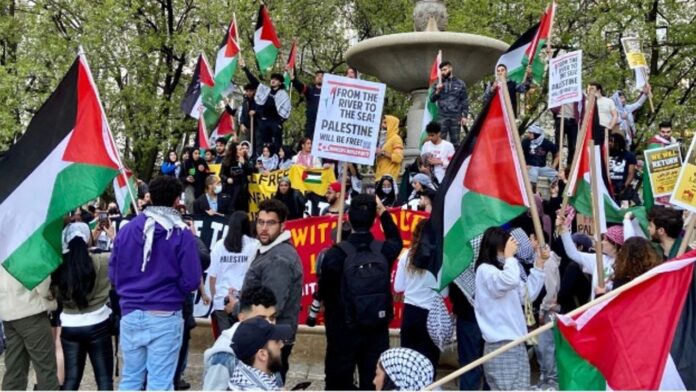
Key Insights:
- The Issue: This is a dispute between WESPAC, a nonprofit, and its insurer, Westchester Fire Insurance, over the potential liability from a controversial protest.
- Risk of Financial Ruin: If the court rules in favor of the insurer, WESPAC could be forced to cover its own escalating legal fees, depleting its limited resources for activism.
- The Broader Implications: This case is setting a precedent for how insurers view nonprofits involved in politically charged activism, signaling potential changes in how coverage is provided.
By Samuel Lopez, USA Herald
[NEW YORK, NY] – The case involving the Westchester People’s Action Coalition Foundation (WESPAC) is raising important questions about coverage for nonprofits engaged in high-risk activism.
The fight centers around a pro-Palestine protest in Chicago, with WESPAC, and a separate lawsuit were WESPAC is named as a defendant being sued by the families of victims from the October 7, 2023, Hamas attack in Israel. The lawsuit, filed in May 2024, alleges WESPAC’s financial support of groups like the National Students for Justice in Palestine (NSJP) and American Muslims for Palestine (AMP), who are accused of ties to Hamas and anti-Semitic messaging.
WESPAC, a nonprofit founded in 1974 and known for supporting unpopular causes, has long been at the forefront of activism for Palestinian rights. In particular, its fiscal sponsorship of NSJP and other groups has earned it a reputation of being heavily involved in pro-Palestinian advocacy. But now, after the tragic October 7 attacks, WESPAC is facing mounting legal pressure, with critics accusing it of associating with groups that support violence.
This case has taken a surprising turn. Westchester Fire Insurance Company, which provides coverage for WESPAC, has filed a declaratory judgment action in New York federal court, arguing that it has no duty to defend or indemnify WESPAC in the ongoing proposed class action lawsuit.
Chicago has been a hub for pro-Palestinian protests, especially following the October 7, 2023, Hamas attack on Israel and the subsequent Israel-Hamas war in Gaza. Protests in Chicago have included street demonstrations, disruptions at political events, and large marches, often organized by groups like the U.S. Palestinian Community Network (USPCN), which WESPAC has supported.
Notable events include a protest on April 15, 2024, where pro-Palestinian demonstrators blocked a freeway leading to O’Hare International Airport, causing significant traffic disruptions and leading to a lawsuit by affected individuals.
From a legal perspective, the implications of this case are enormous. Should the court side with Westchester Fire Insurance, WESPAC could be forced to handle its own defense, which could have a devastating financial impact. Nonprofits, especially those relying on donations and limited resources, are at risk of seeing their ability to continue operations diminished if they are held liable for legal costs.
For activists and protest organizers, this sets a dangerous precedent. If insurance companies begin excluding coverage for politically charged activism, it could stifle so-called “social justice movements” by financially crippling their leaders.
A major part of this case is how it shines a light on the broader tension between insurers and controversial activism. Groups like WESPAC, which are involved in the Palestinian rights movement, are at the intersection of politics, activism, and financial risks. Pro-Palestinian activists have faced scrutiny and legal challenges over their connections to anti-Israel rhetoric, with critics like the Anti-Defamation League accusing WESPAC of supporting hate speech.
But beyond just WESPAC’s financial strain, the case is part of a much larger conversation. What happens when the cost of activism includes legal fees that could bankrupt an organization? What happens when an insurer denies coverage of legal defense costs for advocacy or activism not covered under the policy? And more importantly, what does this mean for the future of nonprofits that engage in social or political activism?
In court, Westchester Fire Insurance is trying to prove that WESPAC’s activities go beyond the scope of what their policies cover. The insurer claims that protests and political activism are excluded from its coverage. If the court agrees, the ruling could set a new standard for nonprofits engaged in politically sensitive activities, leading to stricter policies and exclusions in the future.
If nonprofits like WESPAC don’t have insurers to cover legal expenses in the face of lawsuits, it may drive them out of the activism space altogether. It could even prevent future grassroots organizations from emerging, as they would fear the same legal consequences.
If this case sets a precedent in the courts, it may impact how nonprofits in the future approach their activism. Will they be forced to shift away from politically charged movements? Will activists have to fundraise specifically for legal defense? These are the types of questions that will define the future of nonprofit activism.
Fact-Check Section:


